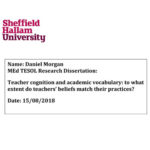September 2013 Foreword
Wen-Chi Vivian Wu
In the first paper, Ramin Akbari & Mohammad Nabi Karimi investigated personal epistemology in predicting valued academic outcomes in education. The authors assert that students with more sophisticated beliefs achieved a higher proficiency as measured by the entrance test. This article can serve as guidance for those ELT instructors who are interested in understanding the relationship between the personal epistemology of learners and their learning outcomes.
Arpine Sargsyan and Sivakumar Sivasubramaniam examined the impact of teaching through literature on teachers and students in their study, as well as the effects of applying literature to teach reading and writing. The findings suggest that teaching reading and writing through literature can be useful for student-centered pedagogies and a reliable resource for language teaching, providing Armenian EFL teachers and learners with numerous benefits.
The third article, written by Chuang Wang, Do-Hong Kim, Mimi Bong, and Hyun Seon Ahn, emphasizes the self-regulated learning strategies and self-efficacy beliefs of Korean college student in EFL learning. The findings of their study revealed that the female students had higher self-efficacy beliefs than did the male students, made more frequent use of SRL strategies, and achieved higher proficiency levels. Additionally, undergraduates had higher levels of self-efficacy beliefs and English proficiency than graduates, but the use of SRL strategies did not differ significantly between the two groups. Pedagogical implications for English teachers who are interested in investigating the related field in EFL contexts have also been provided by the authors.
To investigate applying guided reflective journals in large classes to motivate students to improve their pronunciation independently, Dr Emmaline Lear studied Japanese EFL learners by engaging them in writing reflective journals. Results of the small qualitative study revealed that the reflective journals transformed the common pedagogical focus into promoting motivational behavior to conform to individual learner needs. In order to achieve the goal, students needed to be more independent in the language learning process.
Professor Kim conducted a review study with respect to the idea that writing is too challenging for L2 learners. Some researchers propose that writing be deferred in English language classrooms until after learners become adept in other language skills. The results of the review study showed that learners could not only write in English, but L2 writing was helpful for learning of the target language, because writing could be used for linguistic output, promoting the process of L2 learning. Thus, this article reveals the importance of writing in L2 classrooms and offers another point of view about L2 writing.
To understand the factors causing English language and study skills gaps between two different groups of learners, regular undergraduates and students in a pre-college foundation program, Muhammad Tanveer conducted an empirical study to probe learner weaknesses in English language and study skills. Results of this study revealed that there was a language proficiency and study skill gap between the two levels of learners. Moreover, the author proposes three possible factors related to SLA, students, and the institution’s academic system.
Roby Marlina analyzed three students’ perspectives towards learning English as an international language because there are different varieties of English today, which should be a major component of English teaching. This case study revealed that the three international undergraduates in Australia have benefitted from learning about EIL and have encountered challenges in applying those benefits outside classrooms. Hence, this study provides English educators and scholars with recommendations for incorporating EIL into an English teaching syllabus.
The final article of this issue deals with the importance of working memory in foreign language aptitude. Recently, many scholars have proposed that working memory could be an important element in the field of FLA. Therefore, Yuncai Dai conducted a two-group design study to understand the relationship between working memory and FLA. The findings showed that working memory actually correlated with the learning of complex syntactic rules. Therefore, it can be concluded that working memory could be a potential element of FLA.
I hope you find the articles in this September 2013 issue to be interesting, stimulating, and enjoyable to read. I hope that this issue will help provide new insights that will be valuable in formulating new research studies, and will result in new innovations for EFL practitioners, so as to contribute to continuous improvements in English Language instruction around the world. Finally, I would like to express my thanks and appreciation to the contributors and reviewers of articles and book reviews who have made this issue possible.








